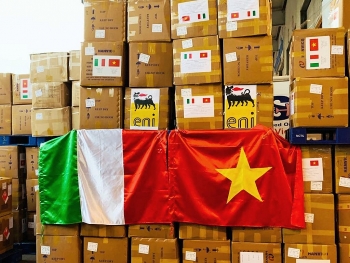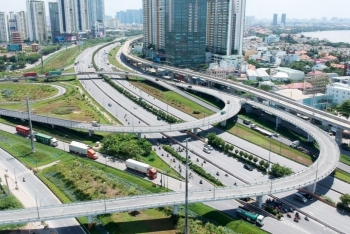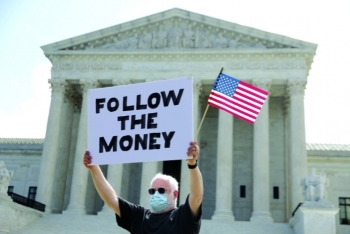The US puts sanctions on Chinese officials after Beijing calls for 'peaceful coexistence'
The announcement was made following the “peaceful” call made by Foreign Minister Wang Yi earlier Thursday saying that China had "never intended to challenge or replace the U.S.," adding that the world's two largest economies should "explore ways for peaceful coexistence."
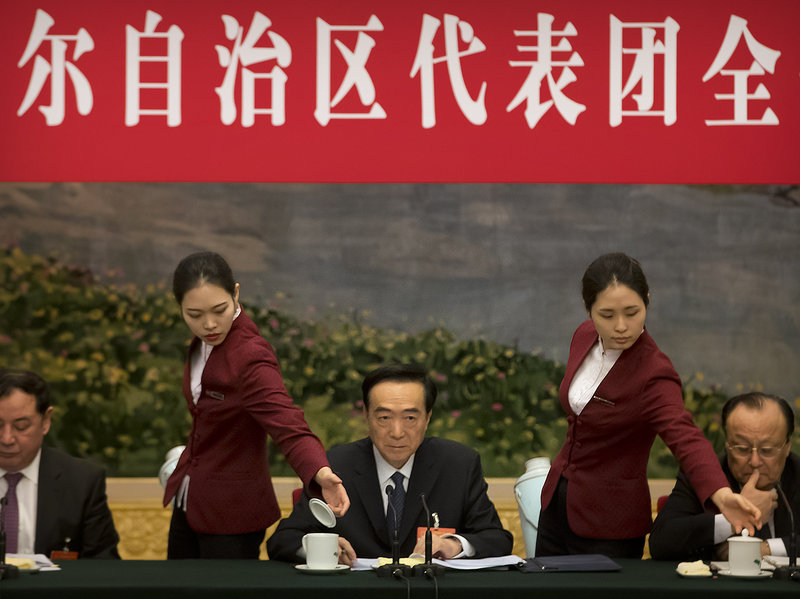 |
| Attendants refill teacups as Chen Quanguo (center), Communist Party secretary of China's Xinjiang Uighur Autonomous Region, listens to a speaker during a group discussion meeting on the sidelines of the National People's Congress at the Great Hall of the People in Beijing, on March 12, 2019. The Politburo member is one of the subjects of new U.S. sanctions over human rights abuses in the region. Photo by AP |
The targets of the sanctions including Chen Quanguo — a member of China’s 25-member ruling Politburo and party secretary of the Xinjiang region — and is likely to anger top officials in the Communist Party given his stature. Other officials penalized include Zhu Hailun, a former deputy party secretary for the region; Wang Mingshan, director of the Xinjiang Public Security Bureau; and Huo Liujun, a former party secretary of the bureau. The bureau also faces sanctions.
| Axios reported that Zhu Hailun was the party secretary of the Xinjiang Political and Legal Affairs Committee, the Chinese Communist Party body tasked with building and running the concentration camps. Classified documents detailing his role in the camps were leaked to the International Consortium of Investigative journalists last year. The Xinjiang Public Security Bureau has contracted with numerous major Chinese companies to build the camps and the mass surveillance regime now blanketing Xinjiang. Some of those companies include HikVision, Megvii, and SenseTime, which have already been included on a U.S. export blacklist. BGI, one of the largest genomics companies in the world, has also worked closely with Xinjiang public security officials on genetic forensics. |
Those aforementioned were allegedly played a major role in devising and enforcing policies in Xinjiang that have detained hundreds of thousands — some estimates put it at more than a million — members of largely Muslim ethnic minorities in indoctrination camps, while also smothering those groups under a net of surveillance.
In recent months, Trump administration officials have criticized Beijing for its response to the coronavirus pandemic as well as its efforts to suppress pro-democracy movements in Hong Kong and human rights issues in Uighurs and other ethnic minorities.
According to New York Times, “The United States will not stand idly by as the C.C.P. carries out human rights abuses targeting Uighurs, ethnic Kazakhs and members of other minority groups in Xinjiang,” Secretary of State Mike Pompeo said in a statement on Thursday, referring to the Chinese Communist Party.
Representatives from the Chinese Embassy did not immediately return a request for comment.
The sanctions against Chinese officials were levied under the Global Magnitsky Human Rights Accountability Act, which was passed in 2016 and gives the United States the ability to impose human rights penalties on foreign officials. But the measures appear largely symbolic, as none of the officials are likely to hold significant assets outside China.
The move also comes after talks first arose in 2018 in the Trump administration to punish senior Chinese officials and companies for the detention of ethnic Uighurs and other minority Muslims in large internment camps. But those discussions languished as trade advisers in the administration tried to negotiate an end to the trade war with Beijing.
In October 2019, the Trump administration imposed visa restrictions on some Chinese officials and import controls on certain organizations in the western region of Xinjiang. While those were the first punishments imposed by any government in relation to the vast human rights abuses there, they were fairly weak even though some American officials have advocated harsher measures.
The actions on Thursday target a cluster of officials who played a major role in devising and enforcing policies in Xinjiang that have detained hundreds of thousands — some estimates put it at more than a million — members of largely Muslim ethnic minorities in indoctrination camps, while also smothering those groups under a net of surveillance.
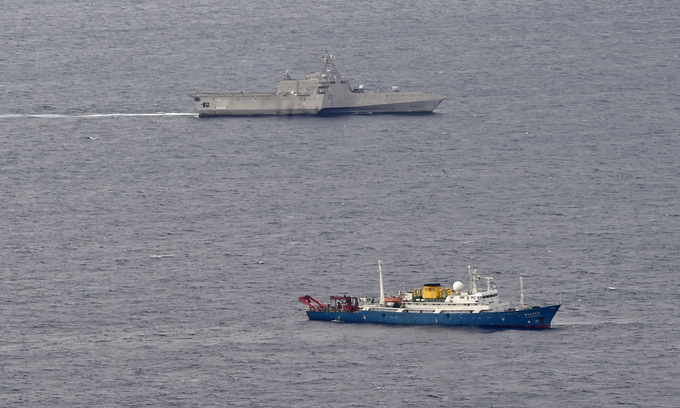 | US and China's confrontation with new cost to pay The US Navy's 7th Fleet on July 2 said the USS Gabrielle Giffords (LCS 10) coastal carrier carried out routine operations near China's fourth Geological ... |
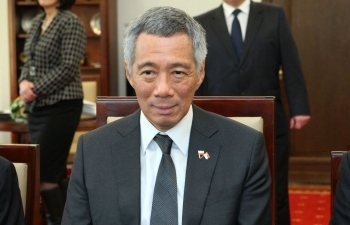 | Singapore PM: China can’t take the US's security role in Southeast Asia Despite its increasing military strength, China would be unable to take over the United States’ security role, Singapore PM Lee Hsien Loong says Thursday. |
 | Coronavirus updated in powers: China accuses US of spreading lies and conspiracy theories China's Foreign Minister Wang Yi accused the United States of spreading 'lies and conspiracy theories' about coronavirus and escalating tensions between the two nations. |
Recommended
 World
World
Pakistan NCRC report explores emerging child rights issues
 World
World
"India has right to defend herself against terror," says German Foreign Minister, endorses Op Sindoor
 World
World
‘We stand with India’: Japan, UAE back New Delhi over its global outreach against terror
 World
World
'Action Was Entirely Justifiable': Former US NSA John Bolton Backs India's Right After Pahalgam Attack
Popular article
 World
World
US, China Conclude Trade Talks with Positive Outcome
 World
World
Nifty, Sensex jumped more than 2% in opening as India-Pakistan tensions ease
 World
World
Easing of US-China Tariffs: Markets React Positively, Experts Remain Cautious
 World
World

